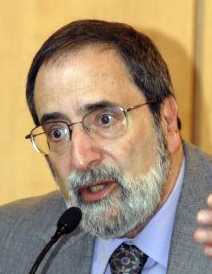By Laurie Baron

SAN DIEGO — Currently playing at the Hillcrest Cinemas, The Other Son places a switched-at-birth plotline in the context of the Israeli-Palestinian Conflict. After Joseph, the son of an Israeli couple takes a blood test for service in the IDF, his mother and father are informed that he is not biologically related to them. Instead, he turns out to be the son of a Palestinian couple who live on the West Bank. To shield newborns from incoming scud missiles during the first Gulf War, the hospital staff moved them to a bomb shelter. When they were subsequently returned, Yacine ended up with to Leila and Said, and Joseph with Orith and Alon.
The two boys have grown up on opposite sides of the green line which now is marked by what Israelis call the security fence and Palestinians call the Apartheid wall. Director Lorraine Levy visually contrasts the poverty and oppressiveness that have shaped Yacine’s life with the affluence and freedom that Joseph takes for granted. Several scenes occur at the most tangible symbol of their different circumstances―the checkpoints which Israelis cross with ease and Palestinians with delays.
Joseph now wonders if he is really Jewish despite being circumcised and schooled in Torah. Though his rabbi seems sympathetic to his dilemma, he insists that Joseph must undergo conversion because his biological mother is a Gentile. Yet the revelation of his identity also clarifies conflicts between Alon and him. Joseph is an aspiring rock musician; his father is a ZAHAL officer who wishes his son would pursue a more practical career. When Joseph finally meets his biological family in their home, he breaks the ice by singing an Arab song which prompts his Palestinian father Said and brother Bilal to accompany him on the Oud and flute, suggesting a genetic origin of his musicality.
Yacine has been a medical student in Paris. Since Yacine has had the opportunity to live abroad, he accepts his new status more quickly than Joseph. He seeks out Orith and Joseph. Not coincidentally Orith is a physician paralleling the notion that the two boys have inherited their vocational aspirations. While Bilal and Said feel betrayed by Yacine’s interest in his Israeli family, Yacine and Joseph share the same fate and bond instantly.
The two mothers exhibit empathy for their biological and “adopted” sons; whereas the two fathers initially cannot jettison the animosities their respective nations harbor towards each other. The first meeting of the parents escalates into a confrontation as the two fathers become embroiled in an angry political debate. Yet the mothers and the sons ultimately pave the way for the fathers to embrace their biological children.
This well acted and sensitively directed is a crowd pleaser. Obviously moved by the two families overcoming their ethnic and religious hostilities for the sake of their “adopted” sons, the audience enthusiastically clapped. I saw The Other Son ten days ago and appreciated its optimism too. As I write this review, however, missiles from Gaza and Israeli artillery barrages and bombs are killing civilians on both sides of the fence and exacerbating the antagonisms between Israelis and Palestinians. In that light, the movie’s reconciliation between the two families strikes me as naïve. Levy has asserted that she intended to make an idealistic rather than a political film. She has succeeded in doing this, but at the price of glossing over the ostensibly intractable security and territorial issues which divide Israelis from Palestinians.
*
Lawrence Baron recently retired from being the Nasatir Professor of Modern Jewish History at San Diego State University. He is the author of Projecting the Holocaust into the Present: The Changing Focus of Contemporary Holocaust Cinema (Rowman and Littlefield: 2005) and editor of The Modern Jewish Experience in World Cinema (Brandeis University Press: 2011). He may be contacted at lawrence.baron@sdjewishworld.com
While I can appreciate your perspective, I think we need a little naivette in art. We look to the news to show the world in it’s ugliness. We look to art to show the world as it should be rather than as it is.
Will the reconciliation of two families change the situation? No, but it’s a start. The real peace process doesn’t happen between the politicians. The real peace process happens on the ground in the personal relationships of families who are able to put aside their differences even for a little while.
Thank you for your review. I’m eager to see this film.